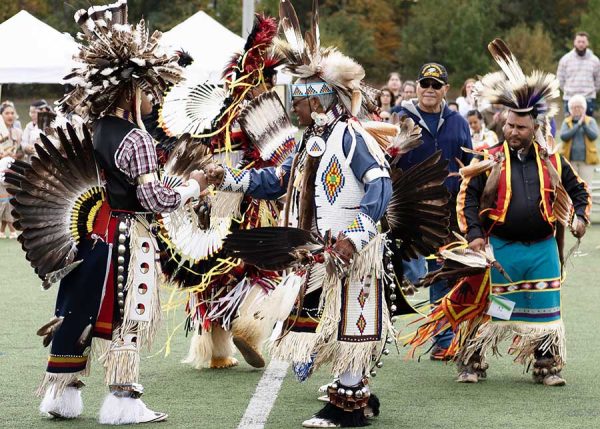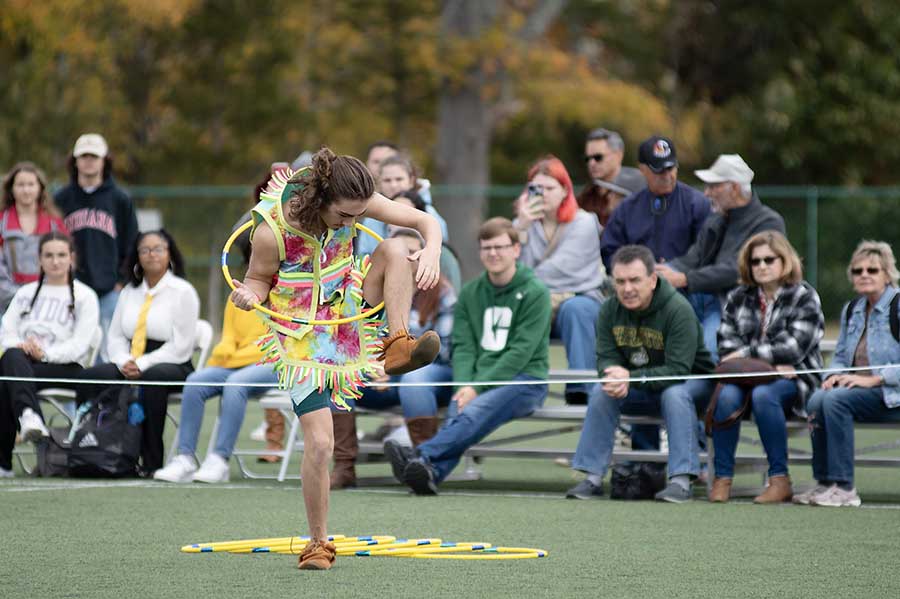Powwow: A way of healing

Fall is starting to say goodbye. The dead leaves coat every surface, and I find myself studying them whenever I leave my cubicle.
It’s the world I’ve known here at UNC Charlotte. It’s my bubble, so to speak. We all have them. Sometimes the bubble needs to be popped. I didn’t realize it until I sat down and talked with someone outside of it.
That person was Michelle Stanley ’13, ’17, ’21 MPA. She’s a member of the Coharie Tribe, one of the eight recognized Tribal Nations in North Carolina. Before I talked to her, I was in the dark about Native American history and how it lives on today. One of the ways is through powwows.
Stanley grew up with them. Originally, her family is from an unincorporated area near Clinton, North Carolina, where she was raised in the Coharie Tribe’s rich history. In fact, her great-great grandfather and great-grand uncle were among the founders of one of the Coharie Indian Schools.
“My earliest memory of a powwow was around three or four years old,” Stanley recalled. “It’s a place of healing.”
For Stanley, she went to a primarily white school outside the border of Clinton and was surprised about how Native American history was taught inaccurately. She found they only taught about specific tribes, erased non-recognized tribes and noticed how Native Americans disappeared after the early 1900s in history textbooks.
As president of the Native American Caucus, the advisor to the Native American Student Association, staff member and part-time lecturer at UNC Charlotte, she discovered that these inaccuracies and misconceptions often travel into higher education throughout the country.
“Most college students have never been taught about Native American peoples by a Native American,” said Stanley. “There are many people who don’t even know we exist.”
NASA provides support to the nearly 100 students identifying solely as Native American on campus. And she is committed to extending the reach of NASA and in creating educational opportunities for everyone in the University community.
With NASA, she has helped plan talking circles, presentations and events for Native American Heritage Month, With the caucus, she is establishing a mentorship network, a book group, workshops and planning several Native American speakers panels and more. One very specific event is a powwow. The one at UNC Charlotte was co-organized by Stanley and Page Freeman (Lumbee, Waccamaw Siouan and Coharie), the president of NASA.
Powwows are a gathering of Native American peoples where they sing, dance and reconnect with family, friends and Tribal Nations to celebrate and honor traditions and histories. It’s an opportunity for Native Americans to share cultures with each other, teach youth and connect together.

Misconceptions about powwows
“A common misconception is that it’s a performance, and it’s not,” said Stanley. “It’s about healing and ceremonial practices. Until the American Indian Religious Freedom Act of 1978, Indigenous gatherings were not protected. Years before that, you could be imprisoned or worse for dancing and other cultural practices.”
Stanley explained how Jim Crow laws also targeted Native Americans. In North Carolina, there are currently eight recognized tribes and one unrecognized tribe. Only one is federally recognized.
“It’s a beautiful, healing ceremony in the sense that we have this history of being criminalized for doing these things,” said Stanley. “Powwows feel like home wherever they’re held.”
These powwows are indeed full of life. The UNC Charlotte Powwow held Saturday, Oct. 29 involved many competitions for adults and youth. Citizens of the Catawba Nation performed as well as many intertribal dances.
For Stanley and the many Native American students, faculty and staff, it was an opportunity to come together and embrace who they are.
This year’s powwow, the first held on campus since 2012, had an estimated 150-200 attendees.
“It will continue. Powwows feel like home, they provide a transient home for Native Americans at UNC Charlotte,” said Stanley. “They are a space for us to be exactly who we are. A space for us to express Indigenous joy, practice our traditions and cultures, to be uplifted and supported by our communities, to reaffirm our identities, and to resist invisibility by publicly showing our survival and the ways we still thrive.”
There’s still more work to be done, but Michelle Stanley is up to the task, and I am grateful for it. I’d like to think my bubble has burst a bit, in the best possible way, as my knowledge expanded. I’m glad Stanley is carving space for such important heritage and traditions and inviting us to enter and learn more.
See more photographs from UNC Charlotte’s Powwow.